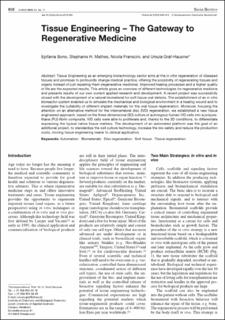Please use this identifier to cite or link to this item:
https://doi.org/10.21256/zhaw-1754| Publication type: | Article in scientific journal |
| Type of review: | Peer review (publication) |
| Title: | Tissue Engineering - the gateway to regenerative medicine |
| Authors: | Bono, Epifania Mathes, Stephanie H Franscini, Nicola Graf-Hausner, Ursula |
| DOI: | 10.21256/zhaw-1754 10.2533/chimia.2010.808 |
| Published in: | Chimia |
| Editors of the parent work: | Alexakis, Domenico P. |
| Volume(Issue): | 64 |
| Issue: | 11 |
| Page(s): | 808 |
| Pages to: | 812 |
| Issue Date: | Nov-2010 |
| Publisher / Ed. Institution: | Schweizerische Chemische Gesellschaft |
| Publisher / Ed. Institution: | Bern |
| ISSN: | 0009-4293 |
| Language: | English |
| Subjects: | Icbc; Automation; Biomaterials; Disc regeneration; Soft tissue; Tissue regeneration |
| Subject (DDC): | 616: Internal medicine and diseases |
| Abstract: | Tissue Engineering as an emerging biotechnology sector aims at the in vitro regeneration of diseased tissues and promises to profoundly change medical practice, offering the possibility of regenerating tissues and organs instead of just repairing them (regenerative medicine). Improved healing processes and a higher quality of life are the expected results. This article gives an overview of different technologies for regenerative medicine and presents results of our own current applied research and development. A recent project was successfully closed with the development of a natural biomaterial for soft tissue oral defects. The establishment of an in vitro bioreactor system enabled us to simulate the mechanical and biological environment in a healing wound and to investigate the suitability of different implant materials for the oral tissue regeneration. Moreover, focusing the attention on an alternative method for the intervertebral disc (IVD) regeneration, we established a new tissue engineered approach, based on the three-dimensional (3D) culture of autologous human IVD cells into a polyurethane (PU)-fibrin composite. IVD cells were able to proliferate and, thanks to the 3D conditions, to differentiate expressing the typical native tissue markers. The development of an automated platform was the goal of an additional project, to standardize the cell culture technology, increase the bio-safety and reduce the production costs, moving tissue engineering nearer to clinical application. |
| URI: | https://digitalcollection.zhaw.ch/handle/11475/3295 |
| Fulltext version: | Published version |
| License (according to publishing contract): | Licence according to publishing contract |
| Departement: | Life Sciences and Facility Management |
| Organisational Unit: | Institute of Chemistry and Biotechnology (ICBT) |
| Appears in collections: | Publikationen Life Sciences und Facility Management |
Files in This Item:
| File | Description | Size | Format | |
|---|---|---|---|---|
| 2010_Bono_Tissue Engineering_Chimia.pdf | 630.92 kB | Adobe PDF |  View/Open |
Show full item record
Bono, E., Mathes, S. H., Franscini, N., & Graf-Hausner, U. (2010). Tissue Engineering - the gateway to regenerative medicine. Chimia, 64(11), 808–812. https://doi.org/10.21256/zhaw-1754
Bono, E. et al. (2010) ‘Tissue Engineering - the gateway to regenerative medicine’, Chimia. Edited by D.P. Alexakis, 64(11), pp. 808–812. Available at: https://doi.org/10.21256/zhaw-1754.
E. Bono, S. H. Mathes, N. Franscini, and U. Graf-Hausner, “Tissue Engineering - the gateway to regenerative medicine,” Chimia, vol. 64, no. 11, pp. 808–812, Nov. 2010, doi: 10.21256/zhaw-1754.
BONO, Epifania, Stephanie H MATHES, Nicola FRANSCINI und Ursula GRAF-HAUSNER, 2010. Tissue Engineering - the gateway to regenerative medicine. Domenico P. ALEXAKIS (Hrsg.), Chimia. November 2010. Bd. 64, Nr. 11, S. 808–812. DOI 10.21256/zhaw-1754
Bono, Epifania, Stephanie H Mathes, Nicola Franscini, and Ursula Graf-Hausner. 2010. “Tissue Engineering - the Gateway to Regenerative Medicine.” Edited by Domenico P. Alexakis. Chimia 64 (11): 808–12. https://doi.org/10.21256/zhaw-1754.
Bono, Epifania, et al. “Tissue Engineering - the Gateway to Regenerative Medicine.” Chimia, edited by Domenico P. Alexakis, vol. 64, no. 11, Nov. 2010, pp. 808–12, https://doi.org/10.21256/zhaw-1754.
Items in DSpace are protected by copyright, with all rights reserved, unless otherwise indicated.